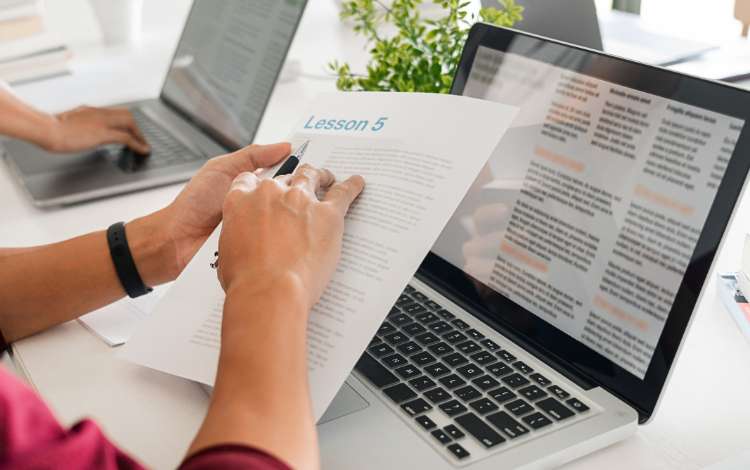
All students want to study effectively. Since time is an extremely valuable resource, they do not want to waste it. At the same time, only a few youngsters understand which path to take to achieve their desired goals.
So, what should you do to reach the next level? Here are five effective techniques to make the most of your study time!
The Reason Students Use Study Techniques
The answer is simpler than you might think. Most people are not used to the intense academic process and the need to focus on many things simultaneously. That is why they should implement different strategies to relieve stress and better concentrate on their studies.
Browse our online courses on meditation, positive thinking, overcoming procrastination, confidence, and freedom from distractions.
Here are some important points you should know.
1. Active Learning
This is one of the most progressive learning techniques worth your attention. Read new material, break it down into separate sections, ask yourself questions, and try to summarize the information you have received.
As you can see, summarization, questioning, and discussion are the three main components. They allow you to understand better and adapt the information you have received.
At first, implementing such a technique may seem difficult. However, you can always use tricks like mind maps to organize and combine different concepts. Use flashcards to repeat important terms or research results.
By the way, practice retrieval to test how well you have remembered the most important aspects. This approach will help you stand out and achieve the desired results.
2. Spaced Repetition
How about progressive techniques? This approach involves reviewing material at increasing intervals. Since you need to transfer information from short-term to long-term memory, spaced repetition helps you overcome key distraction barriers.
You just need to choose the intervals that are most effective for you. This approach allows you to remember even complex terms or academic concepts well.
Implementing new approaches may be difficult, so plan review sessions in advance. Know how many intervals you will use. Use apps like Anki and Quizlet to create flashcards. This trick will help make the process of reviewing important chapters more efficient.
By the way, don’t forget that you can always delegate some assignments to companies like WritePaperForMe to focus on memorizing critical information.
3. Use of Study Aids and Resources
Sometimes, classic academic approaches may seem less effective, and you need to look for alternatives.
Use study aids and resources to boost your understanding and explore different perspectives on the material. Start with different textbooks to analyze your course material in more depth.
You may even want to try a resource like Coursera. Classic YouTube guides can also be useful.
In other words, diversify the ways you learn certain information. Look at the material from different angles and use the most convenient methods to remember it. Thanks to study aids and resources, you will have an additional opportunity to speed up your learning process, so do not refuse new opportunities.
4. Creating a Conducive Study Environment
Your environment directly affects how effectively you memorize information. That’s why you should make sure your desk and chair are comfortable. Buy a lamp that brightly illuminates all your notes. Choose a time when no one will distract you. Turn on music if it helps you concentrate.
Many researchers claim that consistent study habits can significantly increase student productivity. For example, having a designated study spot allows you to prepare for a productive learning session subconsciously.
Time periods also matter. Determine when you are most efficient and adapt your study schedule accordingly. In other words, make your environment as conducive to studying as possible.
5. Regular Self-Assessment and Feedback
Don’t forget that self-assessment is one of the best study techniques. You can read books, articles, and notes endlessly, but did you understand the essence of what you read?
Self-assessment helps identify your weaknesses and strengths. Evaluate how well you understood the material. Ask yourself questions, form a discussion in your head, and draw analogies.
Feedback is the second phase you should move on to. Participate in study groups and interact with other students. Ask them to evaluate how well you remembered the information. Being in a circle of unbiased people will help you quickly understand which aspects you need to improve.
You can also contact your professor. There’s no shame in asking a few questions about how well you coped with the latest assignment.
Get feedback and start re-analyzing those sections and topics that are problematic for you. The point is to speed up the search for gaps, and feedback will definitely help you.
Constant Self-Improving
All these effective techniques are just part of the overall game called education. Your main goal is to perceive studying in college or university, not as a prison sentence or the ultimate goal of your life.
The academic world wants only one thing from you: to develop self-study skills. Your professor can give you thousands of notes, references to studies, or hints, but only your brain can remember them all.
Think of teachers as Morpheus from The Matrix. They can give you a pill that opens the way to the truth, but how you use this new information is up to you.
That is why you study, form useful habits, analyze mistakes, and practice and correct. You have time to progress, so go ahead. If you are diligent enough, you can achieve your goal no matter what.

